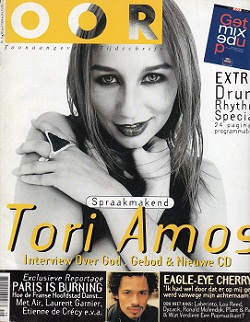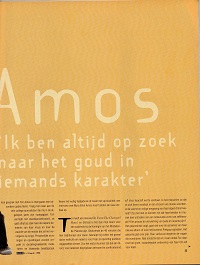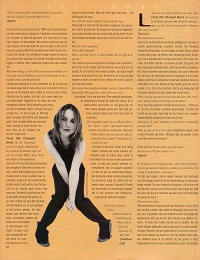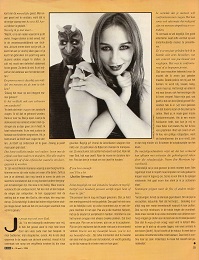|

songs | interviews | photos | tours | boots | press releases | timeline
Oor (the Netherlands)
April 18, 1998

Tori Amos prefers to live in a world which floats between reality and fantasy. The truth can sometimes be hard and confronting, she experienced this personally.
by Edwin Ammerlaan
A conversation with Tori Amos is usually a special event. Ask all the fellow-journalists who went before me during the last years. Tori avoids the standard answer, she always searches for the deeper meaning of her muse and for the value of the subsequently received reaction. Personal experiences and opinions are wrapped in giddy metaphors and blooming imagery. Call it woolly language or call it spirituality, an interview with Myra Ellen Amos hardly ever results in a boring story.
Tori made a new CD, From The Choirgirl Hotel, and this time it's my turn to have an audience with the Queen of the Wiggly Piano Stool. During the traditionally allotted 45 minutes, I get a sneaking feeling that perhaps there is a reason for her use of showy, poetically polished sentences. Could it be that a direct, easily understood answer is too confronting? For herself, that is. Might it be that she rather hides in a flow of beautiful words, in the warm and safe surroundings of her own dream world? Isn't it possible that her lyrics and music are part of a unconscious form of self-therapy? A process to get over old and recent pain? The talk that follows, is not about the recording of her new album or about the upcoming Pinkpop performance. The conversation deals with pain. Losing and emptiness and the questions that remain. Not because I want to, but because Tori chooses to do so with the big, heavy laden subject of her own CD.
At the end of her 1996 tour, Tori Amos knows she's pregnant within a week. From that moment she happily looks forward to the birth of her child and to her new role as a mother. Her career is pushed aside, for who wants to talk about popmusic when you're holding a baby in your arms? Three months later she has a miscarriage. The jumble of emotions and questions soon lead to a flow of words and music. Before she knows it, suddenly enough songs are finished for a new CD.
Why do you expose a delicate and personal subject, like having a miscarriage, to the public this way?
'Because it's important to realize that the root of this album lies in the loss of my child. As soon as you know about this, you will listen to the songs with a completely different intention. Be aware, this is not a victim's album. Actually, it's quite a joyous album.' Tori's interpretation of joy, that is. 'Shiny, Happy People doesn't bring me - although I'm crazy about Michael - any enjoyment. That is exactly what frightens me. Sadness has a rhythm you can dance to as well. Different from R.E.M.'s music, but all the same.'
From The Choirgirl Hotel presents the listener with an almost inhuman task. Your lyrics, just like on previous CDs, are once more unfathomable.
'Wouldn't it be wonderful if you could forget about the lyrics? Burn them as far as I'm concerned. Let yourself be influenced by what the music does to you. Listen to your senses. Your feelings. The music tells
you all you need to know, because the emotions in the music go beyond words. De lyrics are merely a pointer in the right direction. Every sound, every note contributes to the character of the song and is thus a
link in the bigger whole. The miscarriage was only a starting point, the songs subsequently developed into different directions. They are about my perspective of life and about how this life changed after the loss. But the love doesn't go away.... The love doesn't go away.'
You still feel the presence of your little child.
'Of course! I know it would have become a little girl. It's paradoxical. You experience a loss and at the same time you are enriched with a new view on life. For example, I became more susceptible to the pain of others.'
Was the baby planned?
'That's not important.'
But suppose it was, that would only enlarge the pain?
'We knew for some time I was pregnant. Meanwhile you develop a relationship with the living being you carry within yourself. Even if the child will not grow any further, the relationship doesn't have to end because of that. Maybe one day I'll be a mother, I don't know. What I do know, is that it changed me.'
You experience the real loss, in both senses of the word. How does the father deal with this?
[sad] 'He is very reticent. Such a moving event brings you closer together or alienates you from each other. In our case we married three weeks ago. That reveals enough, without violating his right on privacy.'
The tragedy brought you and Mark [Hawley, Tori's steady sound-engineer] closer together. Why did you have to confirm this in an official way? Does the marriage add something?
'Marriage is an old ritual. A sacred ritual. Although a great many people break up in the end, I wanted to know how we would experience this ritual together. I've lived with other men, was monogamous and lived up to the mutual agreements. But thanks to this special ceremony the relationship is a just bit more valuable.'
Why?
'Because this ceremony has existed for centuries, it's a union with historical, cultural and spiritual value.'
Let's talk about that title; From The Choirgirl Hotel. I know you like to describe your songs as girls, so metaphorically speaking the hotel could refer to you?
'Maybe.'
And maybe not.
[laughs] 'The inside cover will portray a map of some mysterious mystical world. That drawing will map the scenery of the songs. My girls make up a group, they are mutually connected. They belong in a fixed part of the universe. This is their territory, their hotel. More strongly, they run the place. The group, the choir, knows no age limit, their origin also doesn't matter. Yet every girl is an individual. A couple of them are sitting on the edge of the pool with margaritas in their hands, another one works with reception and has a telephone-fetish and maybe there's a lady in her room just knitting, or so. This is their territory. It's very important that this own identity comes up to the fore on this album.'
Don't you sometimes think after recording: Hey, it's not a girl, it's a boy?
'I see the songs being born from some sort of... umm vulva. From the universal creative womb. I acknowledge the strength of a man, but I prefer to call them girls. Probably because I'm a woman myself.'
Do you write all your songs from a female point of view?
'No! You should measure my testosterone level sometimes. I bet we would both be startled by the result.'
I detect a recurring form of restlessness in your music. As if you are constantly on the lookout. The question naturally is: what for?
'I ask many questions. Sometimes people feel threatened by those questions, because I regularly ask them in a provocative way. To shock a little. If you'd really know me, you'd nevertheless know I always look for the gold in someone's character. No matter how dreadful that person is.'
So looking nonetheless...
'Presently I'm looking very hard for the gold in God. If you take a look at his career, he's got some rather nasty things to answer for. If I would meet a little crying boy I would tell him a story about dragons, take him outside to play. If that same boy is fifty years old, I would do exactly the same. In short, it would be good if God one day heard my story about dragons and came out to play with me. Maybe this brings me closer to the gold in God. At the same time I'm enormously fascinated by the dark side of the human spirit. My own spirit that is, because it's the only one with an Access All Areas sticker on it.'
I can't quite follow you anymore...
'Wait, there's a reason why I'm telling you this. Asking questions isn't cruel. It's the responsibility of poets. You can do with it whatever you want. You can pass it over or you can use it to ask yourself yet another thousand questions. You'll never hear me make such a conclusive statement. That's not how I think. I want to set myself and my audience thinking.'
And provocation is a means to draw people out?
'As long as it is done in a honorable manner.'
Is it perhaps a cry for attention?
'I think my questions cry out for attention. I want them to be heard. Think about them. Open yourself. Don't let someone else's way of thinking be forced upon you if you don't feel like that. I hate indoctrination. I see many parents take away their children's fantasy. Hey, you're seven years old! You're supposed to ask lots of questions. You're supposed to go and investigate. As long as you don't hurt yourself.'
Maybe that happens because many parents live with the heritage from their own fathers and mothers. Not all parents ask themselves if this heritage is worth passing on.
'There are several ways to climb a mountain and there are many paths to come down again. Even if you know them all, sometimes you reach the summit only to find that there are a hundred more mountain tops to
conquer. That outlook is sacred to me. Wherever our life force is coming from, it couldn't have originated from one particular religion. I grew up with the thesis there's only one God, one religion, one road to the
top. Very shortsighted! I think every religion contains little pieces of magic. Use it to shape your own truth.'
You talk a lot about God.
'Yes, it's an important subject matter to me. I feel like I've been peeped at by a dirty old man all my life. In my bathroom, my bedroom, everywhere. Whenever I did something that broke the church's rules, to make matters worse I had to beg that dirty peeper for forgiveness. Do you understand? Especially the Americans don't understand this at all. They use the Bible to manipulate people. They hide themselves behind the word of God. Don't look at God, look at yourself. At the beautiful and the dark sides. Only then you're capable of loving yourself.'
Is it possible to love someone and at the same time be completely honest with him or her?
'I haven't met that person yet. Imagine, having a difference of opinion with your lover. Then it's not about the actual argument, at those moments many profound powers are involved. Only when you recognize these powers, you have the key to honesty. Intimacy is also about dealing with each others weak spots. Sometimes that causes pain. Pain showing them, pain accepting them. Pain realising the other person doesn't answer your dream. You're not my beautiful house, you're not my beautiful wife... At those moments I usually make a deal with the goddess of the future, and wait patiently for the time when I can handle it better.'
You said you want to confront people with questions. It can sometimes be extremely satisfying just entertaining people.
'I do entertain them. A good entertainer can even present sadness in a amusing way.'
About seven years ago in Seattle, I spotted visitors to one of your concerts running away angry. It was too confronting or they didn't understand you.
'That may have been typical of the music I made seven years ago. Good poetry makes me think. I get happy, angry, scared, you name it. It brings up all sorts of things, also memories I'd much rather forget. But my God, how that makes you feel liberated! Besides, I decided to read that book or to play that record. You know, I don't make beautiful living room music. If you have a beautiful living room, then you'd better not let me in. Ha, ha! I like shades of gray. Not black and white. I like whimsical rock formations, because it makes the buttercups you find there, look more beautiful. I cherish the shadow side of life.'
The history of music points out that artists who are fascinated by that shadow side, can come to a bad end. Take Jim Morrison for example.
'In the end you simply have to do your job as well. Regularly I have to encourage myself to do something I'm not looking forward to. Sometimes a look in the mirror is enough. What matters is how firm you stand.'
Some reach for the bottle or other means...
'Sedatives. I've tried them all. To relieve the pain, of couse. It doesn't help... Fortunately there's always a remnant of life force I can draw from. Even after my miscarriage, in the total emptiness that remained. Don't think, in these moments, I start asking questions of ultimate desperation to the Christian God! Then I ask myself a question: where do I find love? Maybe I'll lie flat on the ground, I may even hug a tree [laughs]. I draw strength from nature. I know there must be a universal love. I'm constantly looking for it. Indeed, I don't make things easy for myself.'
original article
 
 
[scans by Sakre Heinze]
t o r i p h o r i a
tori amos digital archive
yessaid.com
|